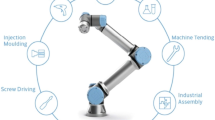Abstract
Collaborative robots (cobots) work in close proximity with human co-workers to accomplish tasks. The proximity of working arrangements and the power required of some cobots for particular tasks means that there is significant potential for cobots to cause damage to their surroundings and people nearby. Working with cobots requires appropriate training and skill. We must ensure that co-workers access appropriate levels of service and functionality from a cobot. We would wish to stop intruders engaging with cobots but also to protect against inappropriate informal working arrangements by colleagues. In this paper, we consider the potential for users’ behaviours to be used as a biometric approach to continuous user authentication. More specifically, we consider how data from a cobot’s internal sensors can be used to characterise a user’s physical interaction with it and serve as a reference template for authentication of that user. We seek to continuously authenticate current user behaviours against these stored characteristic templates while the cobot is being manipulated (as part of a collaborative task). Our approach, based on machine learning and a recognised trust model, can provide a sensible, practical solution to authenticate users continuously as they physically interact with a cobot. Furthermore, it makes use of data that are already maintained by the cobot as part of its general operation. Our work is the first to exploit such data.
Access this chapter
Tax calculation will be finalised at checkout
Purchases are for personal use only
Similar content being viewed by others
References
Bours, P.: Continuous keystroke dynamics: a different perspective towards biometric evaluation. Inf. Secur. Tech. Rep. 17(1–2), 36–43 (2012)
Bours, P., Mondal, S.: Performance evaluation of continuous authentication systems. IET Biometrics 4(4), 220–226 (2015)
Buriro, A., Crispo, B., Delfrari, F., Wrona, K.: Hold and sign: a novel behavioral biometrics for smartphone user authentication. In: 2016 IEEE Security and Privacy Workshops (SPW), pp. 276–285. IEEE (2016)
Centeno, M.P., van Moorsel, A., Castruccio, S.: Smartphone continuous authentication using deep learning auto encoders. In: 2017 15th Annual Conference on Privacy, Security and Trust (PST), pp. 147–1478. IEEE (2017)
Chen, L., Zhong, Y., Ai, W., Zhang, D.: Continuous authentication based on user interaction behavior. In: 2019 7th International Symposium on Digital Forensics and Security (ISDFS), pp. 1–6. IEEE (2019)
Collaborative robots market by payload capacity (up to 5 kg, up to 10 kg, above 10 kg), industry (automotive, electronics, metals & machining, plastics & polymer, food & agriculture, healthcare), application, and geography - global forecast to 2023. https://www.marketsandmarkets.com/Market-Reports/collaborative-robot-market-194541294.html
IFR forecast 1.7 million new robots to transform the world’s factories by 2020, https://ifr.org/ifr-press-releases/news/ifr-forecast-1.7-million-new-robots-to-transform-the-worlds-factories-by-20. Accessed 29 June (2020)
Gascon, H., Uellenbeck, S., Wolf, C., Rieck, K.: Continuous authentication on mobile devices by analysis of typing motion behavior. Sicherheit 2014-Sicherheit, Schutz und Zuverlässigkeit (2014)
Granitto, P.M., Furlanello, C., Biasioli, F., Gasperi, F.: Recursive feature elimination with random forest for ptr-ms analysis of agroindustrial products. Chemom. Intell. Lab. Syst. 83(2), 83–90 (2006)
Maggi, F., Quarta, D., Pogliani, M., Polino, M., Zanchettin, A.M., Zanero, S.: Rogue robots: Testing the limits of an industrial robot’s security. Tech. Rep, Trend Micro, Politecnico di Milano (2017)
IFAC-PapersOnLine A ROS-integrated API for the KUKA LBR IIWA collaborative robot. 50(1), 15859–15864 (2017)
Murphy, A.: Intro: Robotics outlook 2025 (2017). https://loupventures.com/intro-robotics-outlook-2025/. Accessed 29 June 2020
Pedregosa, F., et al.: Scikit-learn: machine learning in Python. J. Mach. Learn. Res. 12, 2825–2830 (2011)
Teresko, J.: Here come the cobots. https://www.industryweek.com/technology-and-iiot/automation/article/21938640/here-come-the-cobots. Accessed 29 June 2020
Author information
Authors and Affiliations
Corresponding author
Editor information
Editors and Affiliations
Rights and permissions
Copyright information
© 2021 Springer Nature Switzerland AG
About this paper
Cite this paper
Almohamade, S.S., Clark, J.A., Law, J. (2021). Behaviour-Based Biometrics for Continuous User Authentication to Industrial Collaborative Robots. In: Maimut, D., Oprina, AG., Sauveron, D. (eds) Innovative Security Solutions for Information Technology and Communications. SecITC 2020. Lecture Notes in Computer Science(), vol 12596. Springer, Cham. https://doi.org/10.1007/978-3-030-69255-1_12
Download citation
DOI: https://doi.org/10.1007/978-3-030-69255-1_12
Published:
Publisher Name: Springer, Cham
Print ISBN: 978-3-030-69254-4
Online ISBN: 978-3-030-69255-1
eBook Packages: Computer ScienceComputer Science (R0)




